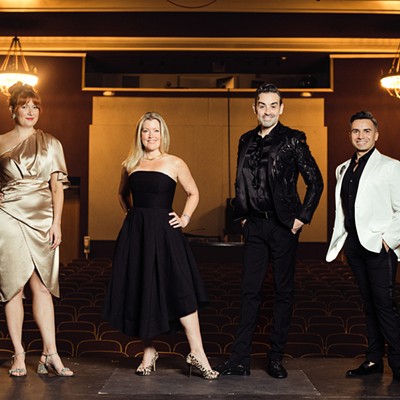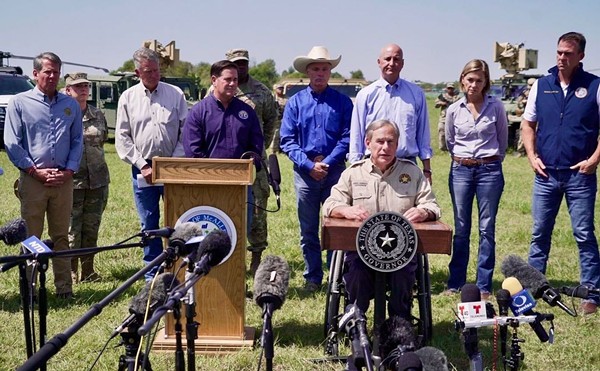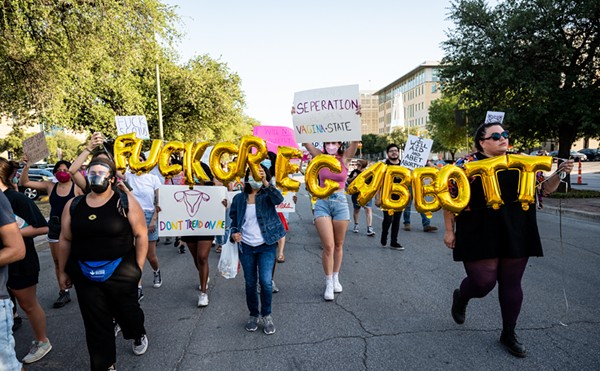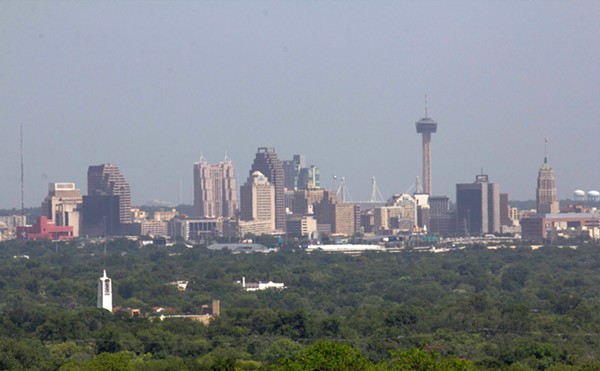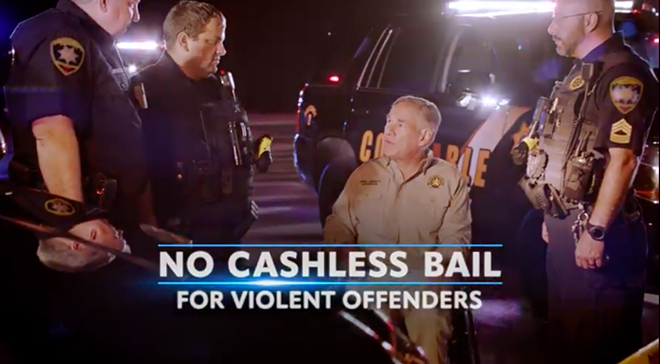
Editor's Note: Bad Takes is a column of opinion and analysis.
While there is a lower class, I am in it, and while there is a criminal element, I am of it, and while there is a soul in prison, I am not free." — Eugene Debs, 1918
As the post-mortems of the midterms roll in, one issue conspicuously sticks out as responsible for GOP gains, underwhelming though they may prove to be. That issue is crime.
Gov. Greg Abbott scare-paigned on a steady drip of "rainbow fentanyl" and crime and "open borders" and crime and "defund the police" and — you guessed it — crime. In lockstep, right-wing media's sensationalized crime coverage shot up like a rocket in the months prior to Election Day. Nationally, Republicans spent a flabbergasting $157 million on crime-related political ads, analysis firm AdImpact found.
In the runup to the election, "The Sanchez Household" received a glossy mailer from the clumsily named Protecting Americans Project Action Fund. "George Soros spent over $1 million to elect a District Attorney who ignores the law and allows criminals to walk free," went its ominous warning. In the Express-News on the Sunday before Election Day, the city's police union followed suit with a full-page ad stating, "We don't need District Attorney Joe Gonzales putting violent criminals back on the streets any longer."
Fortunately, the smears didn't stick. Gonzales won a decisive reelection victory.
While 94% of San Antonians are satisfied with our public libraries, firefighters and emergency medical services, according to a biennial survey commissioned by the city, just 72% of us are satisfied with the police. Still, that's a full eight points higher than in 2018, before grassroots organizations such as Act 4 SA pushed for department reforms in the wake of tens of millions of activists marching against police brutality and systemic racism. In response, Police Chief William McManus, to his credit, banned no-knock warrants and chokeholds. He also pressed for greater discretion in keeping cops with histories of misconduct off the force.
Perhaps the first mistake when discussing this issue is to pretend that holding police accountable and fighting crime are separate conversations. If the public doesn't trust law enforcement, we're less likely to volunteer vital crime-stopping information. After the murder of George Floyd, for example, 911 calls plummeted. Would you want to be the bystander who phones the cops, only to watch a fistfight or petty theft escalate into yet another fatal shooting of an unarmed civilian?
During the campaign, Gonzales' failed challenger, criminal defense lawyer Marc LaHood, specifically targeted the Democratic DA's nuanced position on bail reform. On any given day, there are hundreds of thousands of Americans languishing in jail for no other reason than they can't afford bail. They haven't been convicted, haven't been demonstrated to be a flight risk or a community danger; they're just too broke to get out. And among the easiest campaign tactics is to bombard voters with cherry-picked anecdotes of those who were released on their own recognizance then went on to commit worse offenses.
But the bigger picture paints a far different story. For example, "none of the studies" in a 50-state landscape analysis conducted by Sandra Susan Smith for the John F. Kennedy School of Government "found that bail reforms led to a meaningful increase in crime." Instead, that analysis showed there was "no significant change in the rearrest rate among people on pretrial release."
Over in Houston, Paul Heaton's research for the Quattrone Center for the Fair Administration of Justice determined that a 2017 district court injunction requiring that most people in Harris County charged with misdemeanors be released pre-trial "reduced the system's imprint without adversely impacting public safety." Indeed, it resulted in no spike in crime. When following up three years later, Heaton even observed "modest, negative, and statistically significant decreases in overall crime."
But research like that doesn't make for voter-grabbing campaign ads.
Unfortunately, during election season, even leftists fall into the Willie Horton trick bag.
"As a progressive myself, it's been frustrating to see members of my political group drop the ball," Ana Kasparian wrote in Newsweek this month. After blaming progressive politicos and activists for "downplaying the crime wave," she quoted a Pew Research Center survey showing that "81% of Black registered voters say violent crime is very important to their midterm vote."
But that same survey cited the Bureau of Justice Statistics and the FBI as both reporting "no recent increase in the U.S. violent crime rate." Turns out, "2021, the most recent year with available data, was statistically unchanged from the year before — below pre-pandemic levels and far below the rates recorded in the 1990s," it continued.
What's missing from these takes, and what seems to require more foresight than goldfish-memory electoral cycles will permit, is any attention to the root causes of crime.
For every dollar we spend on early childhood education, on urban renewal, on affordable housing, on removing violence-inducing lead from kids' environments, we could save plenty on cops and prisons down the road. The recent uptick in murders has been universally decried but seldom mentioned in the same breath as the ungodly flood of guns into our cities.
Twenty years ago, Portugal decriminalized all drugs — not just the devil's weed that the Texas GOP can't bring itself to countenance. Today, Portugal's rate of fatal overdoses is 1/50th of what ours is. Meanwhile, in Norway, where the prisons appear downright cozy compared to our housing projects, the recidivism rate is 20%; ours is 80%.
Since 1990, cops in the United Kingdom fatally shot 79 people. Cops here routinely kill that many in a single month. As a civilization, are we somehow inferior to the Portuguese, the Norwegians or the English?
If you believe second chances and social democracy are better solutions to crime than vicious social control on the cheap, there's currently no viable party for you in the United States. But even that grants too much dignity to the Democrat and Republican pissing contest over who's the most punitive. Because what crimes are the middle class supposed to lock their doors in fear of?
Not fossil fuel companies violating EPA regulations with impunity and polluting our air and water, which results in far more deaths than all the murders combined. Not wage theft, which Alec Karakatsanis, executive director of the Civil Rights Corps, pointed out is "a problem about five times the magnitude of shoplifting."
"What is robbing a bank compared to founding one?" playwright Bertolt Brecht once asked.
Well, what is the most heinous act of an individual criminal compared to the crime of locking 2 million human beings in cages? At least 22 prisoners have died in Houston jails this year.
When will we demand leaders who stop bragging about throwing ever more of our fellow citizens in the dungeon?
Follow us: Google News | NewsBreak | Instagram | Facebook | Twitter


